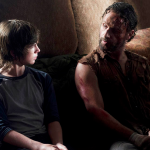One could never accuse Glee of holding its cards too close to its chest: From the very beginning, Glee was clear about its various controversial stances. Its most prominently displayed principle is tolerance, something Glee presents primarily as a sort of stand-in for “love” and a be-all end-all for life philosophy and direction. They’ve spent a lot of time encouraging empathy for and acceptance of a number of relative minorities and underprivileged. I have previously, without blanket endorsement, suggested Christians view Glee as one of the few places on television we can be encouraged to empathize with gay teenagers and the struggles they face, whether or not we accept their lifestyle choice.
But we all know by now that Glee is a monumentally schizophrenic show. It has all sorts of different priorities, every one brutally shoved under the “tolerance” umbrella. Like Christians who often misuse the call to “love one another” or “speak truth” to one another, Glee has taken its keystone and warped it. The key: They put no limits on the term, leaving “tolerance” to stand on its own and against anything that may seek to provide balance.
This past week’s tell-tale episode highlights the show’s fate: a world where every moral question is left not up to any outside authority but to inward emotions and feelings. This is all humdrum typical worldly stuff until we consider the primary audience for the show: middle school to high school kids.
It made sense to me (though I disagreed) to portray the kids in Glee doing things we might disapprove of for the sake of general realism. They didn’t have to glorify the sin in order to portray it, after all. When I heard that the most recent episode, “The First Time,” would portray Rachel losing her virginity, I approached the episode with an open mind. I anticipated a cautionary tale at best, a more clinical and neutral approach at worst.
Instead, Glee pandered unthinkingly to their underage audience. When faced with the question of whether it was alright to have premarital sex (a conviction Rachel had maintained until challenged by the student-director of her high school music in the name of artistic integrity . . . what???), adults are written off as even more screwed up than the kids, completely devoid of actual wisdom. When her friends are consulted, the opinions come out of personal, traumatic experience. The one girl who had sex with the one she truly loved? She says to go for it.
But what happens when these students leave high school? According to the voice of wisdom in Glee, if Rachel has sex with her “first love,” there will be “no regrets.” But will her future husband agree? Will she look back on that moment with fondness once she’s married? I mean . . . who does?
So the message of the show is a more calculated take on the old standby: “If it feels good, do it.” The really frustrating thing about this is that the show is delivering that message to a national audience that doesn’t need to be converted to such a lifestyle. They’re dying for some outside authority to tell them it’s alright to do what they wanted to do in the first place. Glee’s message of tolerance extends way too far, encouraging teenagers to be tolerant of their own base impulses and urges—and to expect those who care for them to do the same.
Glee is preaching to its reluctant choir: “Sing! Sing whatever you want! Sing with whomever you feel! Just mean it from the bottom of your heart!” But in this case, the song is all wrong.











